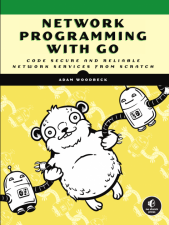Download Chapter 2: RESOURCE LOCATION AND TRAFFIC ROUTING
You can find the book's source code and examples on GitHub.
Build simple, reliable, network software
Combining the best parts of many other programming languages, Go is fast, scalable, and designed for high-performance networking and multiprocessing. In other words, it’s perfect for network programming.
Network Programming with Go will help you leverage Go to write secure, readable, production-ready network code. In the early chapters, you’ll learn the basics of networking and traffic routing. Then you’ll put that knowledge to use as the book guides you through writing programs that communicate using TCP, UDP, and Unix sockets to ensure reliable data transmission.
As you progress, you’ll explore higher-level network protocols like HTTP and HTTP/2 and build applications that securely interact with servers, clients, and APIs over a network using TLS.
You'll also learn:
- Internet Protocol basics, such as the structure of IPv4 and IPv6, multicasting, DNS, and network address translation
- Methods of ensuring reliability in socket-level communications
- Ways to use handlers, middleware, and multiplexers to build capable HTTP applications with minimal code
- Tools for incorporating authentication and encryption into your applications using TLS
- Methods to serialize data for storage or transmission in Go-friendly formats like JSON, Gob, XML, and protocol buffers
- Ways of instrumenting your code to provide metrics about requests, errors, and more
- Approaches for setting up your application to run in the cloud (and reasons why you might want to)
Network Programming with Go is all you’ll need to take advantage of Go’s built-in concurrency, rapid compiling, and rich standard library.
Covers Go 1.15 (Backward compatible with Go 1.12 and higher)

